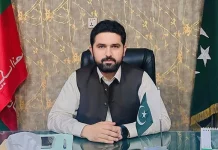By Asghar Ali Mubarak
ISLAMABAD: Defence Minister Khawaja Muhammad Asif has said that Parliament is the supreme institution and it holds the authority to enact laws.
Speaking on the floor of the National Assembly on Tuesday, he said “We respect all institutions, but they have the mandate to interpret the constitution and not to rewrite.”
He expressed concern that interference from one institution into another would weaken the democracy. He said that democracy is far superior to dictatorship and that the respect and constitutional sanctity of the parliament must not be compromised.
He stressed the importance of continuing the democratic journey, acknowledging that while democracy has its shortcomings, these are present even in developed democracies like the UK and the US. “The US and UK are also struggling; candidates are being attacked in the US,” he added.
He added that despite political differences, the institutions of the country must not be attacked.
The minister said, “No system is flawless. We should be thankful that the system is operational in our country. Some people may have some reservations about it, but Parliament is respectable, and question marks should not be placed on it.”
He argued that questioning the legitimacy of Parliament would weaken the system and urged political parties to work towards strengthening democracy and the Parliament.
Regarding the Kashmir issue, the minister highlighted national unity on the matter and reiterated Pakistan’s stance that the Kashmir issue must be resolved in accordance with United Nations resolutions. He lamented that resolutions on Kashmir and Palestine had not been implemented and said that the will of the people of Kashmir must be respected.
He said that Pakistan has fought wars over Kashmir and that the people of Kashmir have made significant sacrifices for liberation from Indian occupation.
Earlier, Federal Defense Minister Khawaja Asif in a message on X, formerly known as Twitter, said Pakistan Tehreek-e-Insaf (PTI) founder Imran Khan’s nominated person for negotiations — Mehmood Khan Azakhzai in negotiations with the establishment, has refuted claims of PTI founder.
“PTI founder’s proposal is nothing but frivolous and political maneuvering as always,” Khawaja Asif said.
“According to founder PTI, Mehmood Khan Azakhzai will represent him in the negotiations with the establishment.
“I had said that in my knowledge it is not possible,” he said. “I asked Mahmood Khan Achakzai in the National Assembly session today wherein he replied in negative that he could not play negotiations role,” Khawaja Asif said.
Pakistan Tehreek-e-Insaf (PTI) Founder Chairman Imran Khan has expressed his willingness to engage in negotiations with the army. He suggests the army appoint a representative for these talks.
“We are ready to negotiate with the army. Let the army appoint its representative, and we will negotiate,” he stated in an informal conversation with journalists at the court on Tuesday.
Imran Khan has clarified that the PTI has never levelled allegations against the army, but has only criticized it when necessary.
He also called Punjab Chief Minister Maryam Nawaz ‘fascist’.
The former prime minister questioned the current political environment, referencing the Special Investment Facilitation Council (SIFC) and Interior Minister Mohsin Naqvi. “What is the SIFC? Who is Mohsin Naqvi? An undeclared martial law is enforced in the country,” he remarked.
He accused Naqvi of being an army representative, stating, “Mohsin Naqvi is their representative; he reached here through them.”
He vehemently opposed any dialogue with Naqvi, accusing him and the inspector general of Punjab Police of oppressing the PTI supporters. “I will never talk to Mohsin Naqvi. He oppressed our people along with IG Punjab,” he asserted.
The PTI founder also addressed the judiciary, specifically requesting Islamabad High Court Chief Justice Aamir Farooq to withdraw from his cases to ensure fairness. “I request Aamir Farooq to withdraw from my cases according to the principles of justice. There are other judges in the high court; transfer the cases to someone else,” he urged.



